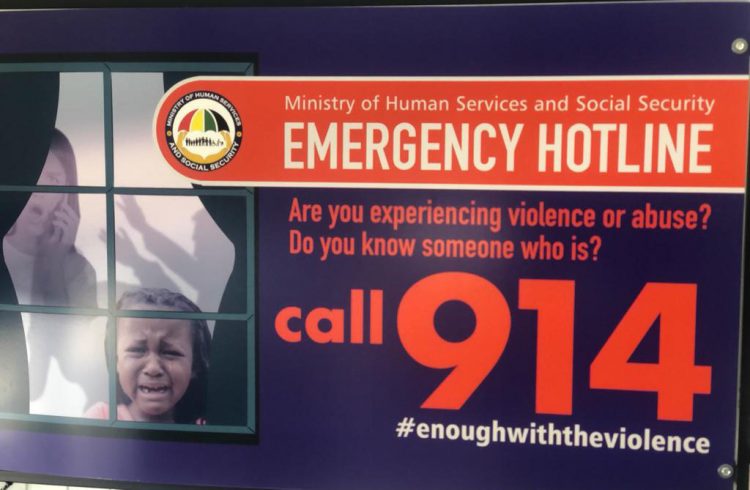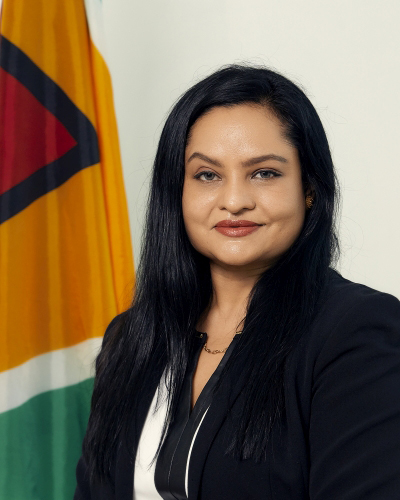As part of its efforts to help eradicate the scourge of abuse, especially against women and children, the Ministry of Human Services and Social Security (MoHSSS) recently launched the Spotlight Initiative programme to educate, spread awareness, and provide intervention to victims of violence regardless of gender and age.
“We want to see people understand that it is not the first recourse. Using your fist and using weapons to hit at each other, that’s not where you should be going. Let’s look at effective and open communication and dialogue…. One life (lost) is one too much,” Minister of Human Services and Social Security (MoHSSS) Dr Vindhya Persaud said.
 In a recent interview with Stabroek News, Persaud explained that the programme is presently in its early stages where the terms of reference are being reviewed and groups are being developed.
In a recent interview with Stabroek News, Persaud explained that the programme is presently in its early stages where the terms of reference are being reviewed and groups are being developed.
“The programme is in [its] early stage. At this point we are having review sessions to determine how it is working, what are the cases coming in and how to improve responses,” Persaud informed.
She explained that the initiative consists of several pillars as it relates to violence, particularly legislation, services, training, and working with civil society organisations to build capacity.
By next month, she said, a number of other programmes which fall within the initiative are expected to be introduced.
The goal, according to Persaud, is to combat domestic violence.
“It’s one thing to have intervention but we have also embarked on awareness campaigns… and this is getting the message out there… there will be zero tolerance for abuse of any kind and avenues too for persons who are. So it’s education, awareness, intervention,” Persaud declared.
“All of that hopefully leading to prevention, that’s the ultimate goal,” she added.
The Spotlight Initiative is a global, multi-year partnership between the European Union and the United Nations to eliminate all forms of violence against women and girls by 2030. It was launched here on November 1st, 2020.
Guyana has been allocated €4.5M ($1billion) to assist its efforts to tackle gender-based and family violence over a period of three years. It is one of six Caribbean countries to benefit from the initiative.
914 hotline
Late last year, a 914 hotline was also launched under the Spotlight Initiative in direct response to the escalating number of domestic and sexual violence cases.
The 24-hour toll-free hotline allows persons to call to report the crime and also seek assistance.
When a call is placed between 8 am and 4.30 pm, it is routed to a trained customer service operator, who, in turn, will connect the caller to a social worker.
Calls made after these hours and during the weekends will be forwarded to the cellphones of social workers where all calls will be addressed with confidentiality. The social workers are expected to provide necessary consultations and refer children and parents to local service providers and other relevant agencies.
Persaud explained that the Ministry has direct collaboration with the Guyana Police Force (GPF) as it relates to dealing with the reports.
“So the level of our outreach to the police force will be at the Commander level and then they will effect what happens thereafter,” she said.
She further explained that the hotline has several components and provides for reports including those that may need immediate attention.
“In other words if someone calls in at that point where they are being abused or violated, at that very point if they can, because sometimes it’s difficult, there would be an immediate response because we would have direct interface with the police,” Persaud related.
She noted that thus far there has been no such case. However, if the situation does arise, measures are in place for action to be taken instantly.
Currently the hotline is being manned by ten individuals from the Child Care and Protection Agency as well as Social Services.
An additional ten persons who will be solely phone operators are expected to join soon.
Persaud informed that these individuals have all completed training with the UN agencies and will be trained continuously.
“I believe this is important because the nature of the reports might change, how they interface is important, how they deliver the service on behalf of the ministry is important and it’s also asking the public to place trust that the number and the system will work,” Persaud said.
“Men are victims too”
Since the hotline has been in operation, Persaud said they have received numerous reports, the majority of which women are the victims.
She however noted that while men account for a small percentage of the reports, they are victims too.
“We have seen not only women being affected but children and there is also, I would say, maybe not a large percentage of men being affected but enough men for me to say that ‘yes, men too find themselves in violent situations’”, Persaud related.
Speaking at the launch of the 914 hotline in December last year, Persaud had reported that in 2019, the Ministry received 1,009 reports of violence from January to July and 568 cases in 2020.
She had stated that police figures show that nine out of ten perpetrators are men and nine out of ten victims are women and the most common type of violence is assault.
Persaud added that 60 per cent of abusers that were arrested have been charged but it is her hope that this percentage will soon increase to 100. She also revealed that 80 per cent of all reported cases involve persons in an intimate relationship.
According to Persaud, reports can be made by the victims themselves or someone who is concerned. During the process, she said, certain details are required to be provided.
“If it is that they need help maybe to go to make a report at the station, or they need [to know] where they have to access a lawyer or a legal recourse,” she said.
Shelter and protection
While acknowledging that there are various types of cases with different levels of urgency, Persaud said that those which entail the victim being provided with shelter and protection for safety purposes is available.
She said that the Ministry has a number of shelters, while there are a “healthy” number of civil society organisations and support organisations partnering to provide facilities for this reason.
“So if someone needs to move, well, we say we can do this, that, or the other, depending on the actual case. Someone might have called in and they want to move but they don’t want to go to a shelter, maybe they just need to go to a family member or maybe they will go to a family member, but after they move to safety what next? And so the help could be given,” Persaud explained.
All the shelters are secured. For security and confidentiality purposes, Persaud said details of shelters are not placed in the public domain.
While being housed, Persaud explained that the victims are being provided with all the necessities including food, clothing and in a lot of cases, training to equip them for the future.
“Some of them are persons who may need to be there longer than a week or two. Some people have been there for months especially through COVID and they come with their children too. So making sure that there is connectivity in the shelter, children have to access schools and some of those persons don’t have any skills and it’s getting to a point where at some point they have to go out there, in a safer environment after the procedures and the process would have been followed, maybe they needed to go to court, whatever, to that point where they are ready to leave, they are going out there, they are better,” she further explained.
According to Persaud, there are various factors which contributed to persons choosing to stay in violent situations such as lack of financial independence and moral support.
“… A lot of women stay in these situations not only [are] they thinking of themselves, they are thinking how they are going to provide for their children,” she said.
“… A lot of people stay in these things because they feel there is nothing and no one to speak to or to get help,” she added.
In addition, Persaud said that counselling is available and is being conducted by probation and welfare officers. However, she acknowledged that they are currently “overburdened”.
As such, the Ministry is hoping to develop a counselling unit, Persaud said.
Persons can also call the hotline to report cases of human trafficking/smuggling.






